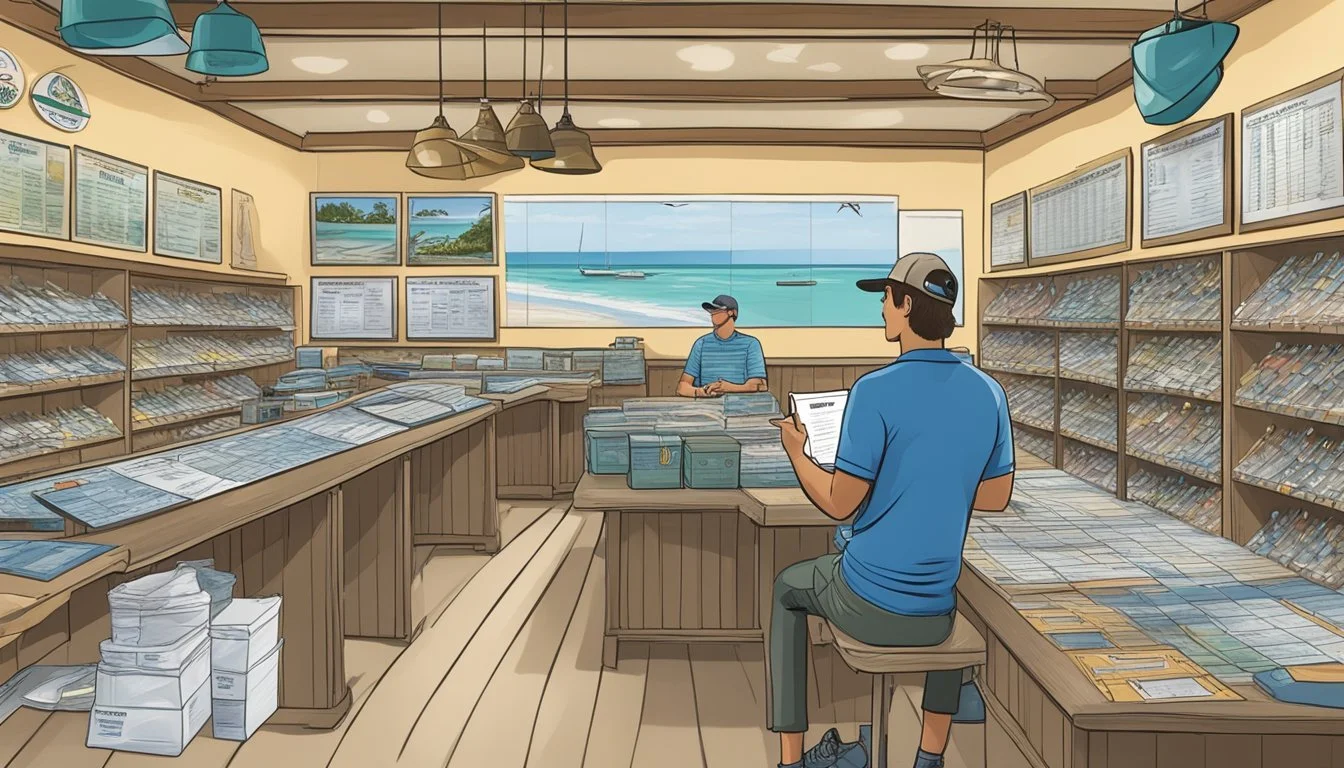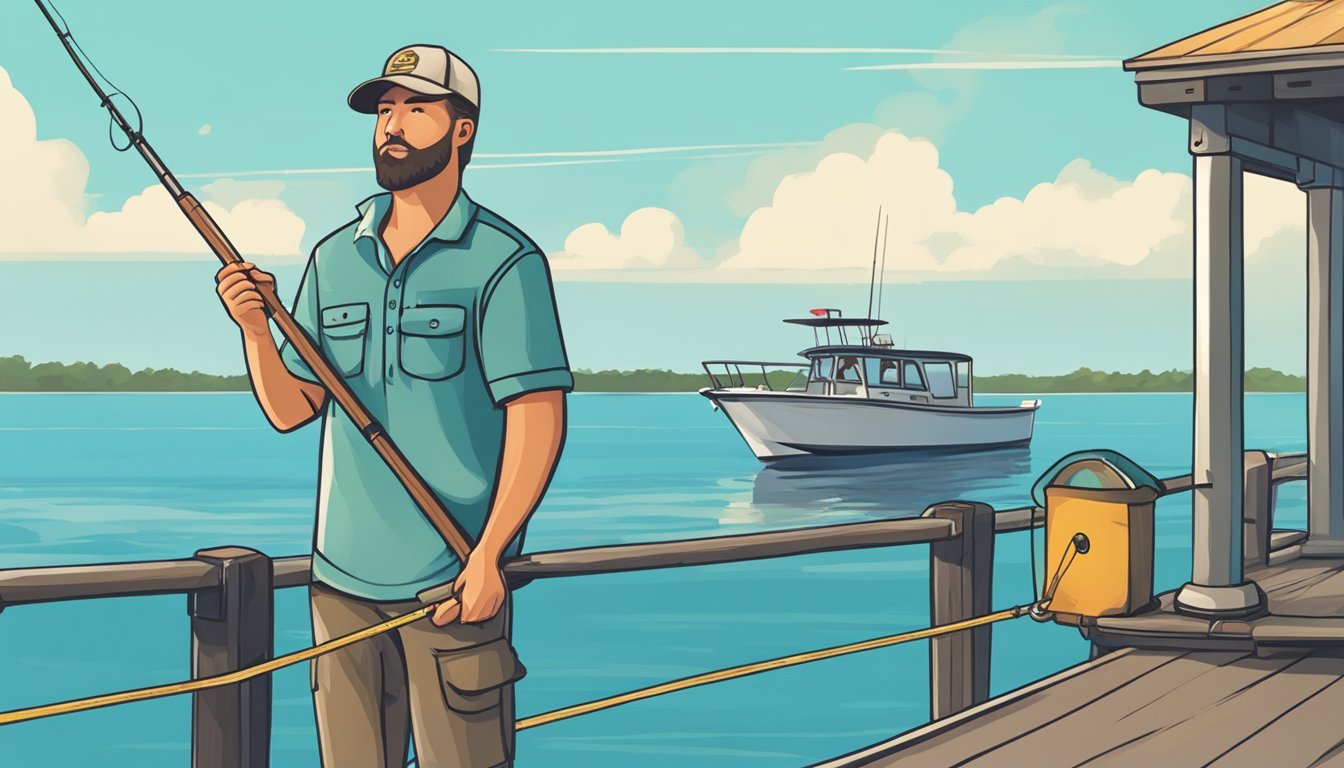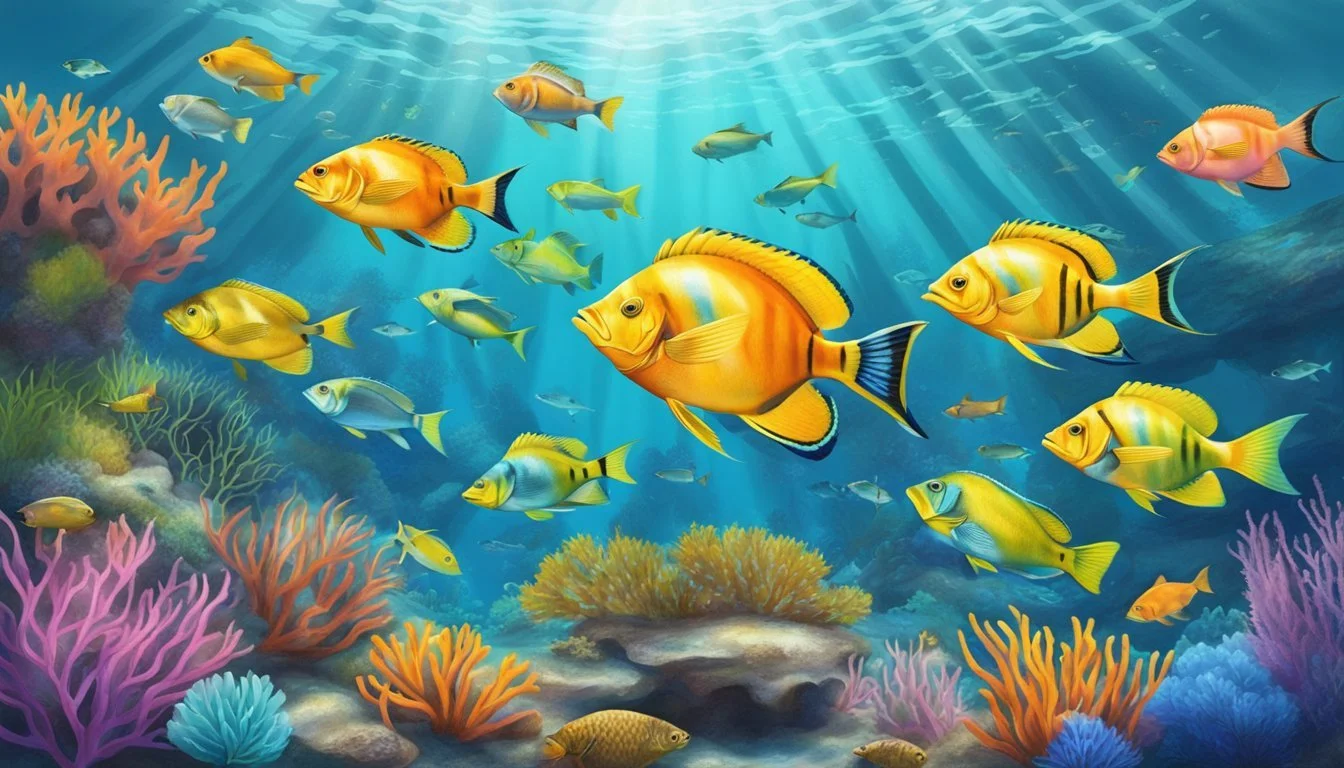How to Get a Florida Saltwater Fishing License
Your Simple Guide
Venturing into Florida's rich and diverse coastal waters offers anglers the chance to encounter a wide variety of game fish (What wine goes well with fish?). To ensure the sustainability of the state's marine resources, the Florida Fish and Wildlife Conservation Commission requires recreational anglers to obtain a saltwater fishing license. This prerequisite is designed to help manage fish populations and provide funds for conservation efforts.
Obtaining a saltwater fishing license in Florida is a straightforward process that can be completed online, in person at county tax collector's offices, or through licensed agents. Residents and visitors need to comply with this regulation to fish legally in the state's oceanic bounty. There are various types of licenses and permits available, catering to different fishing activities such as shoreline fishing or targeting specific species, like snook or spiny lobster (What wine goes well with lobster?).
In addition to the regular licenses, Florida offers several packages that conveniently bundle the necessary permits together. This includes an option for residents that combines all the essential licenses for saltwater fishing into one purchase. Licenses are valid for 12 months from the date of issue, and anglers should note that additional permits may be required for certain species. Free fishing days and lifetime licenses are also available, offering flexibility to those who fish infrequently or want to make a long-term investment in their recreational activities.
Understanding Florida Fishing Licenses
When seeking to fish in Florida, one must differentiate between saltwater and freshwater licenses and understand the types available to ensure compliance with state regulations.
Saltwater vs. Freshwater Fishing
Florida designates fishing licenses based on the habitat—either saltwater or freshwater. A saltwater fishing license is required for taking marine organisms, such as fish, crabs (What wine goes well with crab?), and lobsters from saltwater environments. Conversely, a freshwater fishing license is needed for fishing in non-tidal waters, targeting species found in lakes and rivers.
Types of Florida Fishing Licenses
Several categories of fishing licenses are available in Florida to both residents and non-residents:
Annual Saltwater Shoreline License: This license is free for Florida residents and permits them to fish from shorelines or attached structures accessible by foot.
Saltwater Fishing License: Required for catching saltwater species, this license comes in various durations:
Annual License: Provides fishing rights for one year.
Seven-Day License: A short-term option for those planning to fish for a limited time.
Freshwater Fishing License: Similar to the saltwater license, but for freshwater environments, with annual and seven-day options available.
For those wanting the broadest access, Florida offers combination licenses which include both saltwater and freshwater fishing privileges. Lifetime licenses are also available, offering a one-time purchase for continual fishing rights.
Eligibility and Requirements
When it comes to obtaining a Florida saltwater fishing license, one must first determine whether they are residents or non-residents, as each has different requirements and options for licensing. Residency status significantly affects the eligibility and the type of license one must acquire.
Resident vs. Non-Resident Licenses
Residents are those who have resided in Florida for the past six months, hold a valid Florida driver's license, or are actively registered to vote in Florida. These individuals are eligible for resident annual licenses. Non-residents, on the other hand, are those who do not meet these residency qualifications and must therefore opt for non-resident licensing options.
Requirements for Residents
Residents are required to provide proof of residency, such as a Florida driver's license or voter registration card, when applying for a saltwater fishing license. The options available to residents include:
Annual Licenses: Valid for one year from the date of purchase.
Lifetime Licenses: For those committed to the long term, investing in a lifetime license removes the need to renew annually.
It should be noted that certain individuals, such as those under the age of 16 or seniors over the age of 65, are not required to purchase a license.
Special Considerations for Non-Residents
Non-residents must consider the following when applying for a Florida saltwater fishing license:
Non-residents over the age of 16 need to purchase a license to fish in Florida waters.
Non-resident licenses are available for short-term durations (such as three or seven days) or an annual option.
Switching from non-resident to resident status requires one to provide proof of residency as per the stipulated time frame. Non-residents planning to move to Florida should be aware of these residency requirements to avoid interruptions in their fishing activities.
Getting Your License
Acquiring a saltwater fishing license in Florida is a straightforward process, with multiple options available for purchase to suit personal preferences and technology access.
Where to Purchase a License
Individuals can purchase a Florida saltwater fishing license through various channels. They have the option to buy licenses online, over the phone, or in person at designated locations. This flexibility ensures that everyone, regardless of their location or access to technology, can obtain the necessary licensing.
Online Purchase and Mobile Options
Online: The official Go Outdoors Florida website is the primary portal for online licensing. Consumers can navigate to GoOutdoorsFlorida.com and follow the prompts to select and purchase the appropriate license.
Mobile: For a more mobile-friendly option, Android users can download the Go Outdoors Florida app, which allows for direct purchase from their device. This app provides a convenient and quick way for anglers to get licensed directly from their smartphones.
In-Store Licensing Locations
Walmart: Nationwide chains like Walmart serve as in-store outlets for licensing. Customers can visit the sporting goods section of their local Walmart, where they can purchase a license in-person.
Local Tax Collector's Office: Each county’s tax collector's office is also an authorized place to purchase a Florida saltwater fishing license. Additional authorized agents, which may include tackle shops and sporting goods stores, offer in-person purchase options throughout the state.
Understanding Regulations and Designations
Before one can fish in the saltwaters of Florida, he or she must be aware of the vital regulations that govern size and bag limits, seasonal restrictions, and protected species to ensure sustainable fishing practices and the conservation of marine life.
Size and Bag Limits
Florida implements size and bag limits for various saltwater species to maintain healthy populations. These limits specify the minimum and maximum size of fish that can be kept and the number of each species that an angler can retain in a day. For example:
Snook: The size limit is 28 to 33 inches total length with a bag limit of one per harvester per day during open seasons.
Spiny Lobster: They have a minimum size limit of 3-inch carapace, measured in the water, and a daily bag limit of 6 per person during the open season.
Anglers also need the State Reef Fish Angler designation when targeting certain reef fish species from a private vessel in Florida waters.
Seasonal Restrictions
Seasonal restrictions are set for certain species to protect them during spawning or when they are most vulnerable. For instance:
Snook: They are subject to seasonal closures, with harvest only allowed during specific times of the year to protect the stock during spawning season.
Spiny Lobster: There is a specific season designated for their harvest, which typically starts with a two-day sport season at the end of July, followed by the regular season from August 6 to March 31.
Protected Species Regulations
Regulations strictly protect certain species, and special tags or permits are required to harvest them. It's essential to understand these regulations to avoid hefty fines and contribute to conservation efforts.
A Tarpon Tag is mandatory for anyone who wishes to possess or harvest a tarpon.
For shore-based shark fishing, anglers need to complete a no-cost, online Shore-Based Shark Fishing course and obtain a permit to ensure they understand the species-specific rules and proper handling techniques for the release of sharks.
Special Licenses and Permits
In Florida, a range of special licenses and permits cater to specific activities and groups such as those interested in combination licenses, military personnel, and those in need of permits for certain species. These tailored options facilitate an array of activities including hunting, recreational fishing, and targeted species harvesting.
Combination Licenses for Fishing and Hunting
For those who enjoy both fishing and hunting, Florida offers Combination Licenses that provide the convenience of engaging in both activities under a single permit. These licenses are designed to cover a range of fishing and hunting activities, allowing holders the flexibility to participate in Florida's wide variety of outdoor opportunities.
Specialized Permits and Tags
Specialized permits are required for angling specific species, such as the Snook Permit and Tarpon Tags. These permits are pivotal for those targeting these regulated species and ensure conservation and management efforts remain effective.
Snook Permit: Necessary for anyone looking to catch and keep snook during the open season.
Lobstering and Scallop Permits: Separate permits for those engaging in the harvesting of lobsters or scallops (What wine goes well with scallops?).
Licenses for Military and Disabled Persons
Florida acknowledges the service of its military personnel by offering them certain licensing privileges. Disabled individuals also receive considerations with licenses that cater to their circumstances for both hunting and recreational fishing activities. These licenses aim to ensure that fishing and hunting remain accessible to all segments of the population.
Fishing in Florida: Supporting the Ecosystem
Florida's abundant marine environments are integral to both the economy and the natural beauty of the state. Saltwater anglers and fishing enthusiasts play a pivotal role in sustaining these vibrant ecosystems through responsible practices and conservation efforts.
Responsible Fishing Practices
When fishing in Florida's saltwater locations such as Lake Seminole, anglers should adhere to practices that ensure the long-term health of the marine habitat. Using appropriate gear reduces accidental by-catch and promotes sustainable fishing. Anglers with severe disabilities are also encouraged to engage in responsible fishing, with accessible options provided in various public wildlife management areas.
Gear: Utilize circle hooks and dehooking devices to minimize injury to fish.
Catch and Release: Practice proper catch-and-release techniques to increase survival rates after release.
Contributing to Conservation Efforts
Every time an angler purchases a Florida saltwater fishing license, they are directly contributing funds to conservation programs that support fish populations and maintain the quality of Florida's marine and freshwater ecosystems. These funds help manage public wildlife management areas, preserving key habitats for future 'gone fishing' moments that support both recreational activities and the ecosystem.
License Fees: The funds from fishing licenses are allocated for
Habitat restoration
Stock enhancement
Research and education programs
Conservation efforts also include specific measures tailored to different species and habitats, ensuring that Florida's diverse marine environment remains balanced and resilient.
Additional Resources and Information
When seeking a Florida saltwater fishing license, individuals may benefit from a wealth of resources that the Florida Fish and Wildlife Conservation Commission (FWC) provides. These resources offer detailed information on various licenses and permits, as well as educational opportunities to enhance one's fishing experience.
Educational Materials and Workshops
The FWC provides educational materials and workshops for anglers of all skill levels. These resources cover essential topics related to sustainable fishing practices, local fish species, and conservation efforts. They also include instructions on how to obtain different types of licenses, such as:
Resident Fishing License: For Florida residents to fish in saltwater.
Sportsman’s Licenses: Covering both fishing and hunting activities for Florida residents.
Fishing Permits: Specific permits required for certain species or areas.
Interested parties can sign up for hands-on workshops that often include practical fishing instructions, regulations, and safety practices.
Contacting the Florida Fish and Wildlife Conservation Commission (FWC)
For direct assistance or to clarify any uncertainties regarding fishing licenses and permits, one can contact the Florida Fish and Wildlife Conservation Commission. The FWC offers customer service help for license and permit inquiries as well as other services such as:
Hunting Licenses: Needed for hunting activities within Florida.
License and Permit Information Search: Provides a way to look up requirements for specific activities.
Contact Information:
Phone: A designated hotline for immediate assistance.
Email: An option for those who prefer digital communication.
In-Person: Local offices throughout Florida are open for visitors.
By utilizing these resources, anglers can ensure they are properly licensed and knowledgeable about Florida's fishing regulations and opportunities.
Exploring Florida Fishing Opportunities
Florida's diverse coastal waters offer abundant saltwater fishing opportunities. They can experience the thrill of fishing in Florida, whether they venture solo with a license or join organized events and charters.
Guided Tours and Fishing Charters
For those new to Florida or saltwater fishing, guided tours and fishing charters provide an excellent introduction to local fishing hotspots. Licensed captains lead fishing charters that cater to all levels of experience, ensuring even novice anglers can find success. Options range from half-day jaunts to full-day excursions, with targeted species like the sought-after snook or the challenging spiny lobster. The advantage of opting for a charter includes access to expert knowledge, necessary equipment, and often, no need for a personal license since many charters cover licensing for their clients.
Fishing Tournaments and Events
Florida is host to numerous fishing tournaments and events throughout the year, appealing to competitive florida sportsmen and sportswomen. These events can range from local youth saltwater fishing contests designed to encourage young anglers, to large-scale competitions targeting specific species such as the Florida lobster combo tournaments. Participating in these events often requires a valid fishing license, but they offer a unique opportunity to engage with the fishing community and showcase angling skills. The events can be ideal platforms for turkey hunters and deer hunters as well to dabble in fishing during the offseason, adding to their outdoor pursuits.
Whether one chooses a personalized fishing charter or competes in a lively tournament, Florida's saltwater fishing experiences are designed to cater to all interests and skill levels.





